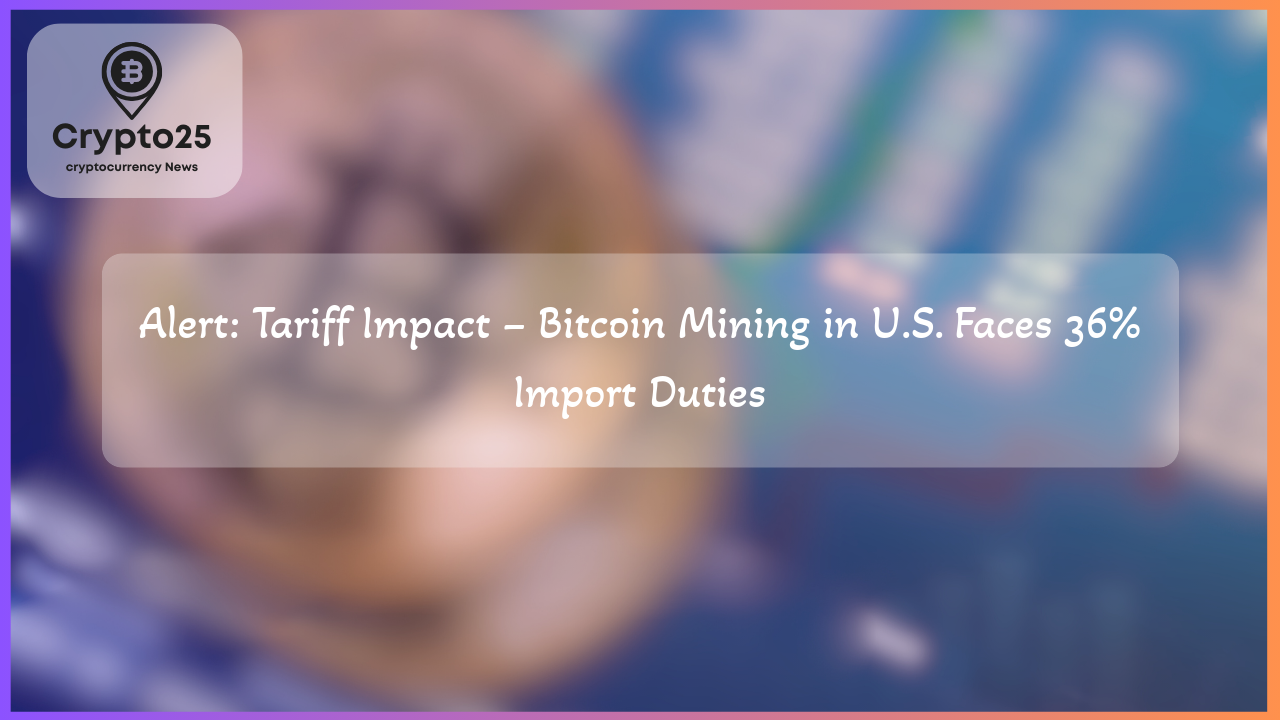
The United States has emerged as a key player in the Bitcoin mining industry since China’s 2021 crackdown reshaped the global crypto landscape. With affordable electricity and access to capital markets fueling rapid growth, American mining firms initially thrived. However, new policy challenges threaten these gains, creating significant concerns for the long-term sustainability of U.S. Bitcoin mining operations.
### U.S. Bitcoin Mining and Its Dependence on Southeast Asian Equipment
An unexpected vulnerability has surfaced for U.S. Bitcoin miners: dependence on Southeast Asia for mining equipment. Key players such as Thailand, Malaysia, and Indonesia produce the lion’s share of the machines that power American mining rigs. This reliance has become a critical issue as the current U.S. administration, under President Trump, enacts trade policies that impose steep tariffs, including a potential rise to 36% on these imported machines. Though temporarily paused for 90 days, the general 10% tariff remains in effect, creating financial and operational uncertainty for miners.
Industry leaders are already sounding the alarm. Ethan Vera, COO of Luxor Technology, expressed concerns about the impact of a 36% tariff increase on mining profitability. He explained that the significant cost hike would make it nearly impossible to recover capital investments in these machines. This is particularly concerning for operations in states like Georgia, Texas, and New York, where frequent hardware upgrades are essential to staying competitive.
For context, Marathon Digital, one of the largest Bitcoin mining firms in the U.S., mined 9,430 Bitcoins last year, valued at over $796 million. Their success depends heavily on maintaining cost-effective operations, but rising equipment prices could put serious pressure on their bottom lines. High-performance mining machines, priced at $4,000 to $5,000 each, may become prohibitively expensive with the proposed tariff increases, potentially leading to a decline in U.S.-based Bitcoin mining.
| Title | Details |
|---|---|
| Market Cap | $1.2 Trillion |
### Tariff Freeze Sparks Import Rush Amid Investor Concerns
In light of the temporary pause on the tariff hikes, U.S. Bitcoin miners are scrambling to adapt. Many are expediting imports of mining equipment to avoid potential cost spikes, while others are reevaluating their strategies altogether. This 90-day window has sparked a wave of contingency planning, from delaying key contracts to exploring international sites for future mining facilities.
Taras Kulyk, CEO of Synteq Digital, revealed that this unpredictability has already pushed multiple clients to consider relocating their operations abroad. He emphasized that stable and predictable trade policies are essential for attracting the substantial investments needed to maintain competitiveness in Bitcoin mining. However, uncertainty surrounding Trump’s administration’s policy decisions undermines investor confidence, particularly in a sector that hinges on precise financial planning.
Yet, not all firms are reconsidering their U.S. operations. Compass Mining’s Vishnu Mackenchery reaffirmed his company’s commitment to U.S. expansion but acknowledged the challenges posed by unresolved tariff questions. For firms like Compass Mining, a clear resolution is critical to overcoming logistical issues and sustaining growth in the domestic market.
### Challenges Ahead for America’s Bitcoin Mining Industry
The current trade policy dilemma is not just a financial issue but a potential turning point for U.S. dominance in Bitcoin mining. Dependence on imported hardware from Southeast Asia highlights vulnerabilities that could disrupt the industry’s momentum, particularly as tariffs make equipment more costly to acquire. While President Trump has pledged to bolster U.S.-based Bitcoin mining, his current policies could inadvertently push firms to consider relocating operations to more stable international markets.
Moreover, an index tracking leading mining companies has already declined 12% since the tariff announcement, underperforming the broader S&P 500. This signals growing unease among investors. If regulations do not stabilize soon, the U.S. risks losing its position as a global leader in the Bitcoin mining space, despite its abundant resources and market advantages. Industry players are now racing against time, highlighting the urgent need for clearer and more consistent policies to secure the future of U.S. crypto mining.
From market uncertainties related to tariffs to broader concerns about operational costs, the U.S. Bitcoin mining industry faces critical challenges ahead. Nevertheless, with appropriate policy adjustments, the sector could recapture its momentum and cement its leadership in the rapidly evolving global cryptocurrency ecosystem.
